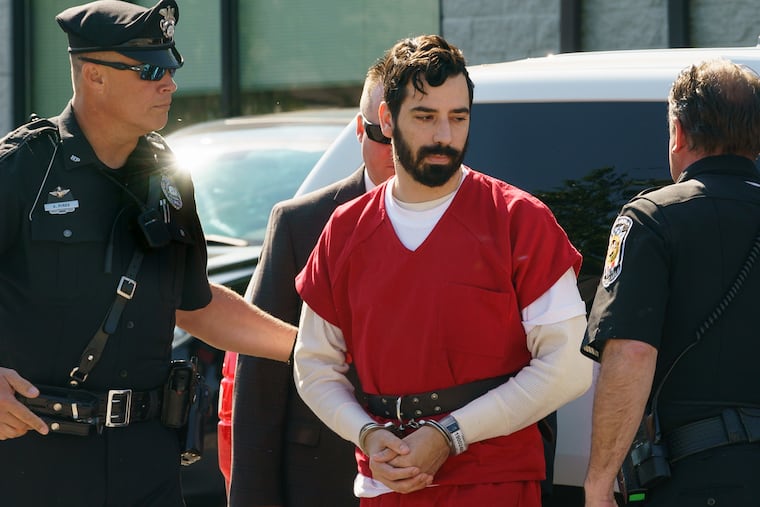Domestic violence is an ‘immense problem’ in Pa. Gov. Shapiro should make it a priority.
The governor should create a new Office for Domestic Violence to tackle a problem that has killed more than 1,600 Pennsylvanians in the last 10 years.

In March of 2019, Stephanie Miller drove to a Radnor Wawa to pick up her son, in what was supposed to be one of her regular custody exchanges with his father. Over the years, he had threatened her, and she had received a protection from abuse order from the court, which had expired only months earlier. She chose a crowded, public spot for the custody exchange, thinking it would protect her. But it didn’t.
That day in 2019, Miller’s ex-husband shot and killed her in front of a store full of customers. He was convicted last month of first-degree murder.
Miller was one of more than 1,600 people who have died in Pennsylvania over the last 10 years as a result of domestic violence. In 2021 alone, 112 victims in this state lost their lives during violent incidents involving family or intimate partners, according to the Pennsylvania Coalition Against Domestic Violence.
Gov. Josh Shapiro cannot solve such a deeply rooted and inherently complex crisis, but he should send a simple and powerful message in his early days in office, by making the fight against domestic violence a top priority within our state government.
For years, the state has provided important resources to victims of domestic violence, relying on a loose network of government agencies and nonprofit organizations to distribute much-needed services and support. But there is no single state agency or director responsible for this urgent priority. Out of the seven main Department of Human Services program offices, none are exclusively devoted to domestic violence — a surprising omission for a state agency whose strategic mission is “to protect and advocate for some of our most vulnerable Pennsylvanians.”
The scale of domestic violence is truly staggering.
“The scale of domestic violence is truly staggering.”
The Centers for Disease Control and Prevention estimates that about one-third of American women and nearly one-quarter of American men report experiencing some form of “severe physical violence” from intimate partners during their lifetime. This can have long-term consequences for them and their children; a 2021 study found that two-thirds of the nation’s recent mass shootings have included domestic violence or been perpetrated by someone with a history of domestic violence. Almost every social or criminal problem in America has at least some correlation with domestic violence.
In our state, we have essentially left the coordinating of services to manage and prevent domestic violence to the Pennsylvania Coalition Against Domestic Violence, the nonprofit center established in 1976, and to the dozens of local domestic violence organizations that provide frontline services. Each of the local domestic violence organizations provides shelter and other services to survivors, such as free legal advocacy. While I was working at some of these organizations, their critical efforts were supported by a bewildering patchwork of federal and state grants and state and local agencies, with no centralized assistance from the state’s executive branch.
It’s not like that, however, in nearby New York, which maintains the country’s only executive-level state agency dedicated to the issue of gender-based violence: the Office for the Prevention of Domestic Violence, created in 1992. Creating a single office devoted to combating domestic violence would enable the government to coordinate its response to the problem, and help prevent it.
In addition, our state does not follow the nationally recognized model implemented in Maryland, requiring law enforcement to adopt a program that specifically aims to decrease domestic violence homicides. As part of the program, law enforcement responding to domestic violence incidents ask the victims a series of 11 questions to assess the immediacy of the danger they face in order to prioritize connecting them with their local domestic violence programs. So far, only about one-third of Pennsylvania’s law enforcement agencies participate in this lifesaving program.
Everyone agrees we should reduce, if not eliminate, this terrible human problem. But old bureaucratic patterns and habits are often hard to break, and despite the best intentions, we remain mired in a continuing crisis without the benefit of fully committed state leadership. Shapiro should break this stalemate by creating a new Office for Domestic Violence and empowering the director to implement a more robust, state-based system for collecting and sharing data, and mandating that first responders follow Maryland’s program to determine if someone’s life may be at risk as a result of domestic violence.
Domestic violence is an immense problem that will not be easily solved, but the first step toward a solution is not that difficult. We must make fighting domestic violence a true statewide government priority in 2023 and beyond.
Rachel Haynes Pinsker is the managing attorney for the Domestic Violence Legal Center for the Community Action Partnership of Lancaster County.